Whosoever desires constant success must change his conduct with the times. Niccolo Machiavelli
By changing your email behaviour during the week, hopefully you have reduced the email overload, have a clean inbox . In addition you should have saved time. In the long term this will allow you to continue to reduce the email related stress and improved your productivity and well-being.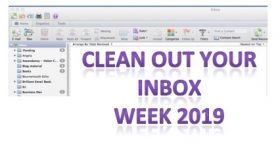
Now the trick is to keep a clean inbox and keep it under control. This means nudging and encouraging others to change their email behaviour.
Email addiction is one of the major causes of email overload. It’s the feeling that you must constantly check your inbox no matter where you are, what you are doing or what the time of day. Moreover, we often default to email when of course there are a myriad of other ways to communicate. Try Mesmo Consultancy’s PNDP framework to help you choose when an alternative niche be more effective such as WhatsApp, IM, etc.
Day five is about taking stock, checking you are not suffering from email addiction and making plans to keep your inbox out of the email overload zone. Here is our three step plan for the last day.
Use Mesmo Consultancy’s free Email Addiction self-assessment tool. Identify your strengths and weaknesses and if necessary seek advice about how to control the urge to have another email fix.
In the coming days and weeks as you are about either to Reply/Forward or even ‘Send’ pause and ask yourself would an alternative be more efficient (eg talking, a discussion group on something like SharePoint, instant message etc)?
Look back to Day 1 and how much time you were losing. Now re-calibrate using our Cost of Email Misuse Calculator. Where do you still need to make some changes?
How will you keep your inbox slim and control the email overload in the coming weeks? Don’t let email rule your day. Don’t feel you must check your email either first thing in the morning or every five minutes. Rather try to disconnect from time to time. The most productive people are those who prioritise their time and stay focused on the task in hand.
Do you have colleagues who would benefit from managing their email more effectively as you have now done? Yes, then call us now to ask about our Smart Email Management master classes. Otherwise how about giving them a copy of either ‘Brilliant Email’ or ‘Taking Control of Your Inbox’?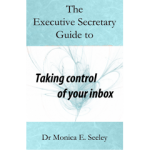
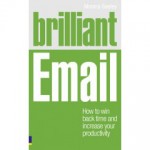
Share your progress; Email; Facebook: Twitter (using #cleaninbox) There is a prize (a copy of ‘Brilliant Email‘) for the person who has made the most outstanding progress. For instance, had five days of empty inboxes, reduced the number of rounds of email ping-pong by improving their email etiquette etc.
![]() Follow me on Twitter using #cleaninbox.
Follow me on Twitter using #cleaninbox.
![]() Join our Facebook page.
Join our Facebook page.
Thank you for joining us for this the 10th International Clean Out Your Inbox Week. Feedback on how we can improve this event for next year is always appreciated.
Tags: Business email overload, clean out your inbox week, email addiction, Email behaviour
Is email the only way? We now have an array of digital communications from social media to the phone. Last week a client complained at being emailed by another colleague who sat just five desk away. How often does this happen to you? We have a love hate relationship with email: its fast and easy but not always the best communications channel. An over dependence on email at the expense of other channels is one of the primary causes of email overload. Yet how many of us make the effort to think outside the inbox before hitting send.
Very few judging by many of my client’s experiences. However, some leading organisations are being innovative and for example banning all internal emails and having no email days in an effort to both reduce email overload and improve communications. These range from high-tech companies to housing associations and architects. Others are setting boundaries outside which its OK to stop checking emails.
My email behaviour will influence your behaviour here are three ways to encourage others to think outside the inbox.
1. Provide an incentive for them to talk to you.
2. Use an alternative tool to provide information which people really need, for example the form for requesting leave, a sales update, for example OneNote, a collaborative platform such as Slack or Yammer.
3. Implement email free times and email free office zones.
To reduce the email dependency (and even email addiction) above all else make sure you create the role model: next time you are about to hit send, get up and walk and talk to the person. Try responding to external email with a phone call? You might be pleasantly surprised at the extra information you pick up to help progress that important sale.
Indeed stopping checking emails is fast becoming the new stop smoking for some.
Tags: email addiction, Email alternatives, Email behaviour, Slack, Think outside the inbox, Yammer
Whosoever desires constant success must change his conduct with the times. Niccolo Machiavelli
Email overload is stressful and can also be an underlying cause of mental health issues. Hopefully you have reduced the email overload, have a clean inbox and improved your productivity and well-being.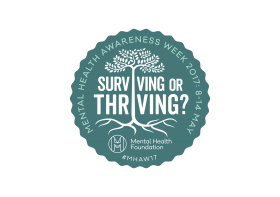
Now the trick is to keep your inbox under control and encourage others to follow suit.
Email addiction is one of the major causes of email overload. It’s the feeling that you must constantly check your inbox no matter where you are, what you are doing or what the time of day. Moreover, we often default to email when of course there are a myriad of other ways to communicate. As many of you will know I am a great fan of pen and paper especially for saying thank you and taking ownership when being asked to do something rather than retorting with ‘send me an email’.
Day five is about taking stock, checking you are not suffering from email addiction and making plans to keep your inbox out of the email overload zone. Here is our three step plan for the last day.
Use Mesmo Consultancy’s free Email Addiction self-assessment tool. Identify your strengths and weaknesses and if necessary seek advice about how to control the urge to have another email fix.
In the coming days and weeks as you are about either to Reply/Forward or even ‘Send’ pause and ask yourself would an alternative be more efficient (eg talking, a discussion group on something like SharePoint, instant message etc)?
Look back to Day 1 and how much time you were losing. Now re-calibrate using our Cost of Email Misuse Calculator. Where do you still need to make some changes?
How will you keep your inbox slim and control the business email overload in the coming weeks? Don’t let email rule your day. Don’t feel you must check your email either first thing in the morning or every five minutes. Rather try disconnect from time to time. The most productive people are those who prioritise their time and stay focused on the task in hand.
Do you have colleagues who would benefit from managing their email more effectively as you have now done? Yes, then call us now to ask about our Brilliant Email Management master classes. Otherwise how about giving them a copy of either ‘Brilliant Email’ or ‘Taking Control of Your Inbox’?
Share your progress; Email; Facebook: Twitter (using #MentalHealthAwarenessWeek) There are two prize for the two people who have made the most outstanding progress (a copy of ‘Brilliant Email‘ and ‘Taking Control of Your Inbox”). For instance, had five days of empty inboxes, reduced the number of rounds of email ping-pong by improving their email etiquette etc.
![]() Follow me on Twitter
Follow me on Twitter
![]() Join our Facebook page.
Join our Facebook page.
Thank you for joining us for this the re-run of Clean Out Your Inbox Week to support Mental Health Awareness week We hope we have made a small contribution to helping people re-focus their work-life balance and de-stress.. Feedback on how we can improve this event for next year is always appreciated.
Tags: Business email management, Business email overload, email addiction, Mental Health Awareness Week, well being
We all know that email overload is the biggest drain on our ability to perform well in both social and work situations. ‘Unsubscribe’ is an easy to ready and witty new book from Jocelyn K. Glie. 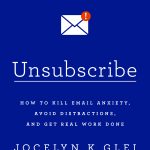
Whilst it doesn’t tell us anything we did not already know, it presents the information in an easy to read format. Also it has some very good cartoons and graphics to exemplify the points and especially in relation to how easily we can waste our day just dealing with our inbox. Glie provides advice on how to:
For anyone serious about conquering email overload and re-claim their lives from the dreaded inbox this makes a useful addition to the existing books on time and email management.
Tags: email addiction, Jocelyn K. Glie, Unsubscribe
It’s been an astonishing few weeks for email news. First, there was the Yahoo breach of security. Then the death of the Blackberry and now a survey from Adobe which revealed yet again just how email addiction is increasing and email response times decreasing.
1. Addicted to email. A recent survey from Adobe reveals that 45% of users check their email even in the bathroom. A frightening 17% still read them whilst driving and 57% check them in bed. Click here to check your own level of email addiction.
The survey also found that half the respondents expect a reply within one hour. This is twice as fast as five years ago, found in previous research from Mesmo Consultancy. Moreover our research revealed that it is usually internals’ who have such an expectation. External senders being prepared to wait longer. Little wonder many feel unable to switch off despite the known downsides of the always on culture.
Although this new study is based on USA respondents, it makes interesting reading and especially for any Director concerned with improving productivity and well-being of their employees.
2. Yahoo hacked. In late September Yahoo finally admitted that over half a billion user’s personal data had been compromised when Yahoo was targeted by hackers over two years ago. Two vital actions for all Yahoo users: first change your password. Second, consider switching to an alternative such as Gmail or Outlook.
3. Passwords are still the weakest link. Michael Chertoff, former head of US Homeland Security revealed that few people set strong passwords. Many default to simplistic ones which can easily be hacked. Click here for more on password management and how to set a secure password.
4. Are those personal apps a potential security threat to your company? Tech companies such as LinkedIn, MySpace and Dropbox have suffered major data breaches, with security research company Ponemon putting the average cost per breach at $4m (£3.2m), or $158 per stolen record. Whilst most organisations let you use these and other apps on your mobile device, Ponemon suggest others too such as Slack, Evernote and WhatsApp, may well be a potential security threat. Once your personal device has been hacked company data on them too can easily be leaked. Although most organisations have tight security policies and practices, getting people to apply them to their personal devices can be very hard as seen above.
5. Death of the Blackberry. That device which was heralded as the mother of improved productivity met its death in late September. Beloved by nearly as many as hated it. Responsible for more divorces than any other piece of modern technology and a nose dive in productivity and well-being should we mourn its passing or rejoice?
Although this new study is based on USA respondents, it makes interesting reading and especially for any Director concerned with improving productivity and well-being of their employees.
Tags: Blackberry, email addiction, email response times, Mesmo Consultancy, Password Management